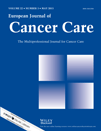Is a nurse-led telephone intervention a viable alternative to nurse-led home care and standard care for patients receiving oral capecitabine? Results from a large prospective audit in patients with colorectal cancer
Is a nurse-led telephone intervention a viable alternative to nurse-led home care and standard care for patients receiving oral capecitabine? Results from a large prospective audit in patients with colorectal cancer
Home care nursing has been shown to be a valuable service for patients receiving oral chemotherapy; however, associated costs can be high and telephone-based services may be more cost-effective options. This prospective audit explored the usefulness of a nurse-led telephone intervention for supporting cancer patients treated with Capecitabine, comparing historical findings from a randomised trial evaluating a home-based intervention over standard care with a modified nurse-led telephone follow-up intervention. Self-reported toxicity and service use were assessed in 298 patients who received nurse-led telephone follow-up, compared with historical data from 164 patients (81 receiving standard care and 83 home care intervention). Findings suggested that nurse-led telephone follow-up can potentially lead to reduced toxicity (chest pain, vomiting, oral mucositis, nausea, insomnia) when compared with standard care, and that it has a similar impact on the management of some symptoms when compared with home care (i.e. vomiting, oral mucositis), although it was not as effective as the home care intervention for other toxicities (diarrhoea and insomnia). These encouraging findings need to be explored further using a randomised trial design before we reach any conclusions. Further research should also include a health economics study to assess the cost-effectiveness of the telephone-based services for patients receiving oral chemotherapy.




